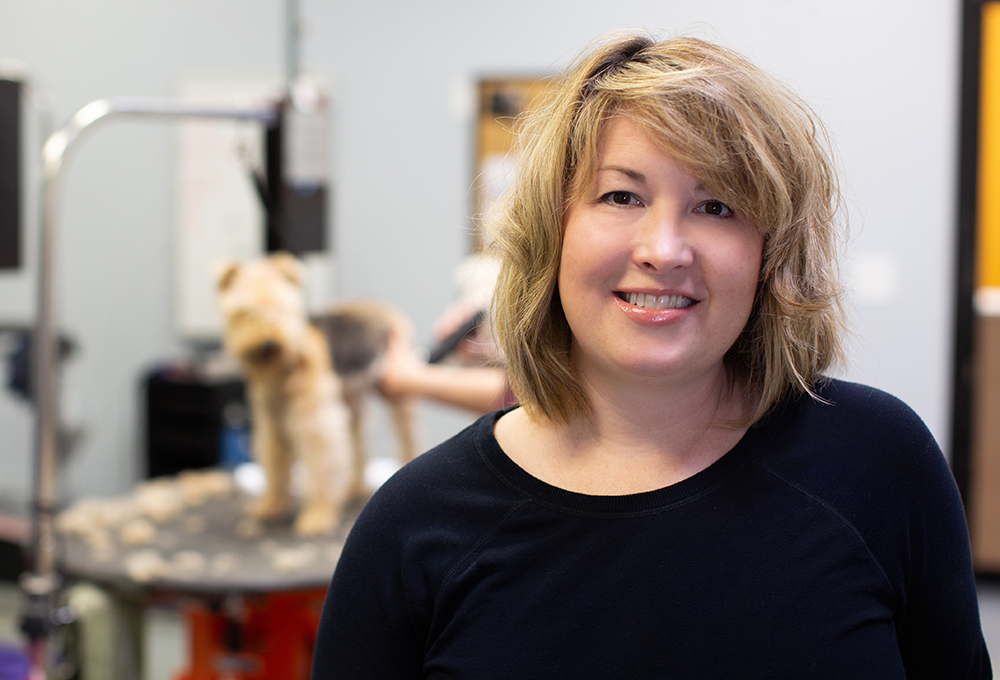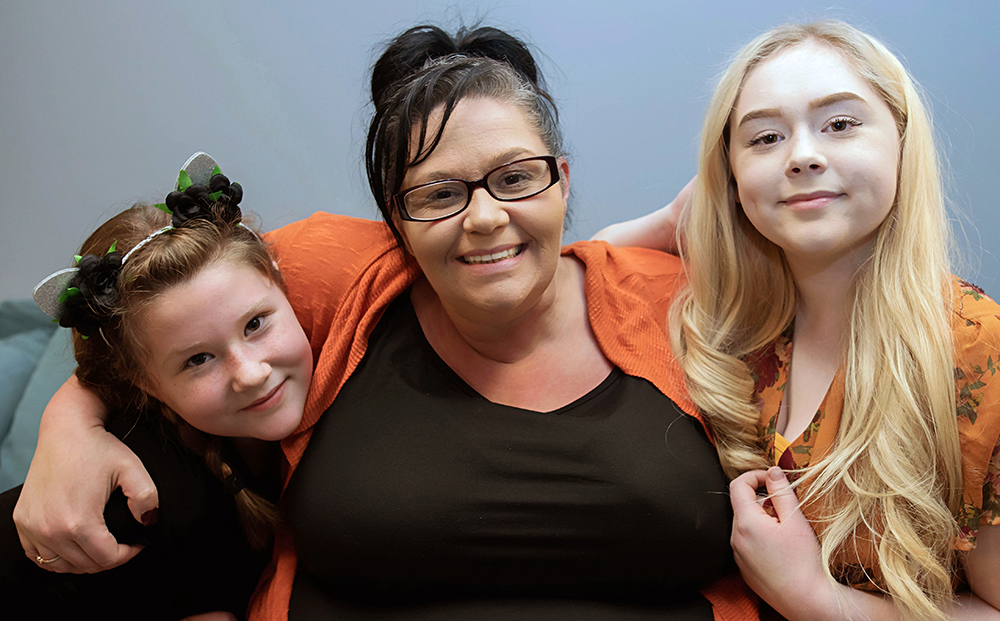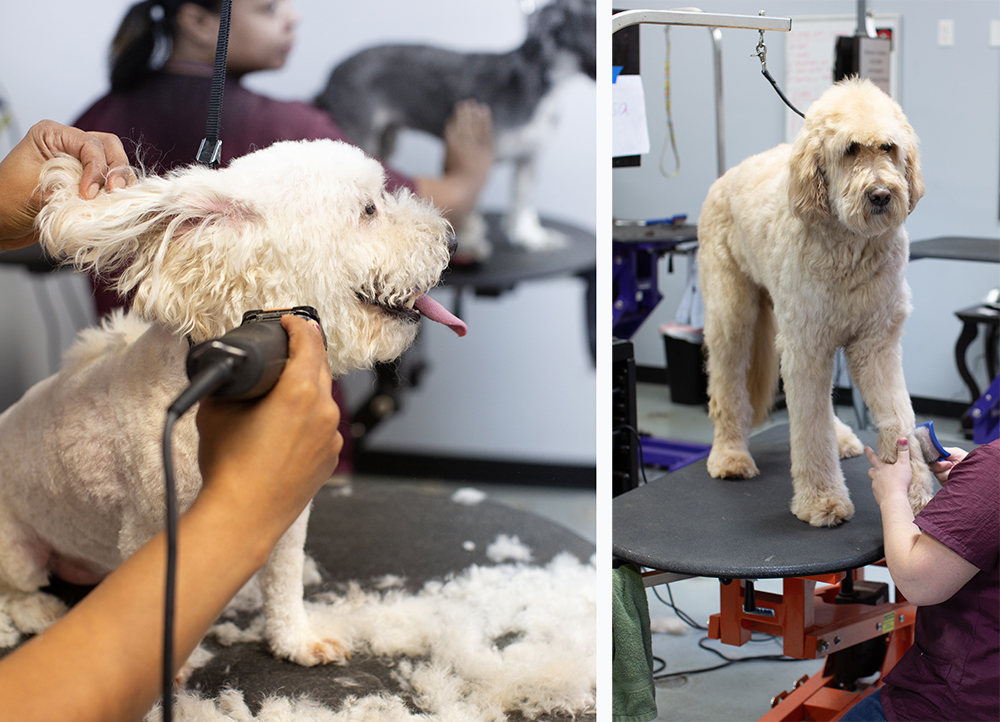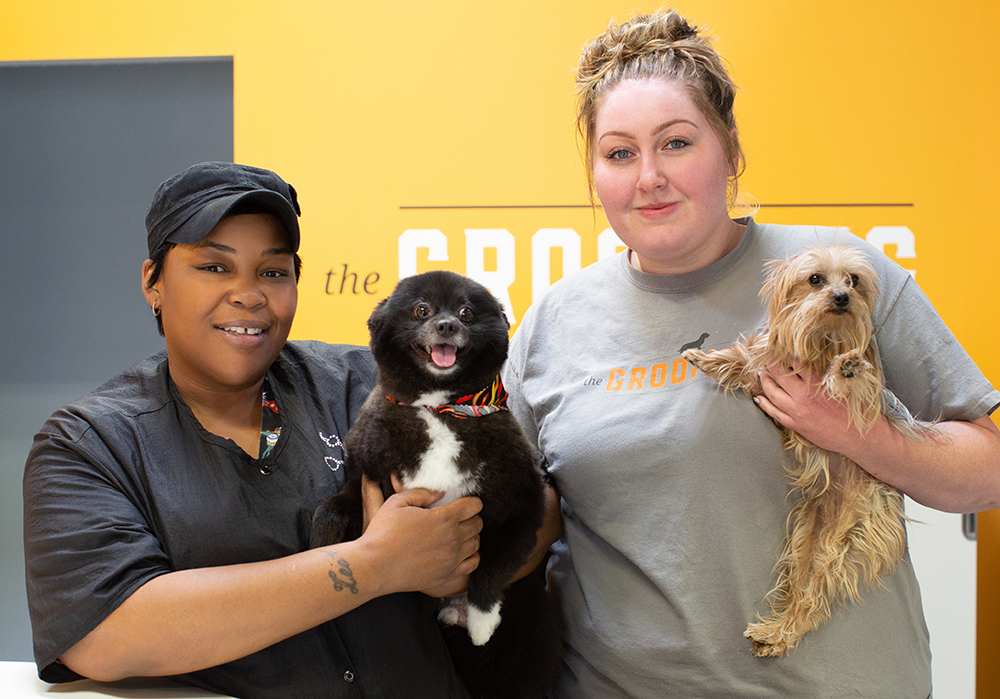
This could be a story about dogs.
How some are left behind. Abandoned. How they don’t fit in with certain parts of society. How we think of them when we see them when we’re stuck at stoplights but forget them as soon as red goes green. How some never find a home and are left to live out their remaining days in cages.
Yes, this could be about dogs. It’s not, though. It’s about dreams.
Barbie Daniels dreamed of a life where she wasn’t making and selling meth, a life where she could have her kids back.
Lindsay Massoth dreamed of finishing her GED after getting kicked out of high school and becoming a mom at 16.
Christine Banks dreamed of a day when she and her kids were off public assistance. She even dared to imagine her kids becoming adults who would never have a need for food stamps.

Natasha Kirsch had a dream, too. After a lifetime of taking care of Kansas City’s impoverished women and children, she had a vision: a not-for-profit school that would teach poor and homeless moms and women the trade of dog grooming while also instructing them in life skills—parenting, job readiness, finances, coaching, mindfulness, emotion regulation.
It was a good plan, and she knew it. She had done the research: pets are a $70 billion industry in this country. And her mom, a professional dog groomer herself, wasn’t just being dramatic when she said she could never find enough help.
The thing was, though, Kirsch just couldn’t get financing.
After years of knocking on the doors and ringing the phones of countless people in Kansas City only to be told “No,” or “Hell, no,” or—even worse—completely ignored, she nearly gave up on her dream. She even said the words: “I’m done.”
Just days later, though, she was standing in front of an abandoned garage on Troost Ave. that was filled with hay and mice and cobwebs and god knows what else, explaining her vision for a school that would help homeless women get back on their feet.
Next to her stood a longtime Kansas City philanthropist, and the president of the city’s economic development council. The men asked her, “What do you need to get this rolling?”
“I had never done this,” she said the other day. “I thought, ‘Do I ask for $5,000? $50,000?’ So, I just went for $100,000, knowing it was going to take probably $250,000.”
That day those years ago, the men looked at their shoes. Finally, one of them looked up and said, “OK.”
The Grooming Project at 5829 Troost Ave., is now in its fourth year. In that time, the school has gone from an idea to a non-profit with an annual budget of $1.2 million. Kirsch’s first class was six students. One was living in her car with two kids and a felony on her record.

“I had another mom who was 28 years old and had four kids, and she was raped by her father from age 6 until she ran away at 13,” Kirsch says. “At 13, she started living on the streets, got addicted to drugs and started having her own kids. So, when we get her at 28, she doesn’t know how to drive a car, she can barely read, she’s never had a job before, so we were like, ‘How do we train her to actually be able to work?’”
The Grooming Project has placed 100 percent of their graduates, though not all are able to stick it out. Kirsch estimates a 70 percent retention rate. Some of the women now are making $50,000 to $60,000 a year. They’re paying their own rent. Their kids have consistent childcare. Simple trips to the grocery store are no longer filled with dire and humiliating choices.
“I was so scared to get off of food stamps and government assistance because I relied on it so much,” Christine Banks says. “But then once I did get off of it, it felt so good because I was able to buy food every week. It was like, ‘Oh, we can get bananas.’”
Just recently, Kirsch and company opened a grooming salon in Lee’s Summit, where graduates can take the next step in learning the trade.
A lot of the women at the Grooming Project in Kansas City call Kirsch their hero. She wards off the compliments and accolades like Wonder Woman deflecting bullets off her bracelets.
“The moms that make it through, they are unreal,” she says. “They are the strongest women that I have ever seen. They have that survival mentality where they’re just going to make it.”
In a business full of strong, determined women, Barbie Daniels is among the most persistent and charismatic. Listen to her speak for just a few minutes, and you’ll be ready to run through a wall for her.
“When we go to court with our moms, I tell them, ‘Have you ever seen Rocky?’” she says. “‘I’m the Mickey in the corner.’”
You wouldn’t know it, but Daniels once was homeless. She cooked and sold meth. She had lost her kids. Her job prospects probably were less than zero.
Daniels says if Kirsch hadn’t given her a chance she would have been out living on the street again.
“I’m a felon,” Daniels says. “I have no job experience. You can’t put down on a resume, ‘Drug dealing, with experience in entrepreneurship, distribution, and people skills.’ I couldn’t put anyone I knew down as a reference. I didn’t know how to work a computer. I didn’t know how to do anything in an office.”
What she could do was put just as much into her recovery as she did her addiction. She was willing to work however many hours she could get and learn whatever skills they could teach her.
Today, Daniels is a caseworker for the Grooming Project. A lot of the women the school tries to reach are poor African-Americans who sometimes don’t connect with Kirsch. Some of them initially consider her just another middle-class white woman looking for absolution for her white guilt. Daniels, who also is white, is the hammer Kirsch uses when she’s not getting through.
“At first, I wouldn’t have the trust of my students, because they were, like, ‘What the hell do you know?’” Kirsch says. “Barbie comes from a background they can relate to. When she comes in and says, ‘No, Natasha really is here to help you and you need to be honest with her,’ they start to listen.”
The first steps after recruitment are listening to students’ situations and helping them remove barriers. Without cars, how can they get to class? Without childcare, who can watch their kids? Without money, how can they get off the street?
Kirsch said they’ve had students who have to ride a bus for two hours with young kids to get to class. Others have been in incredible pain from infected teeth, so Kirsch and company have had to find dentist partners to work on teeth for free. Some women have come into the program and couldn’t read the whiteboard—not because they were illiterate (though there’s that, too), but because they couldn’t see. They didn’t even know they needed glasses.
“There are so many barriers that they’re working against,” Kirsch said. “A lot of them wouldn’t have any food, so we help them get food stamps. We’ve helped three or four people get cars. When students are here and attending class, they get a stipend of $125 a week they can use toward housing or a car or whatever they need.”
All of this from dog grooming? Yes. And no.
Christine Banks had been around a few dogs growing up, but she wasn’t sure grooming pets was what she wanted to do for a living.
“I was, like, ‘Naaaaaah,’” she says. “Once I came and did it, though, I was like, ‘Wow, this is amazing.’ I found it relieved a lot of stress I had going on in my life. Just being able to help, I’ve always wanted to help something or someone. Now that I’m in the program, I love what I do.”

Lindsay Massoth, another graduate of the Grooming Project, will be joining Banks in Lee’s Summit as a co-manager of the new salon. She’s learned to groom pets, but she’s learned much more.
“They gave us the tools to start making our dreams come true,” Massoth says. “And it’s a place where we didn’t even think about it. I never thought about owning my own business, but she put this thought in my head, and they’re so confident in me. It makes me feel like, ‘Well, if they believe in me, maybe I should believe in myself.’”
Self-worth often is at the core of what the Grooming Project addresses. Kirsch said in her upbringing, it never occurred to her that there were things she couldn’t do if she wanted, mostly because she had a supportive family. Her students often don’t.
“They had families that told them they were worthless,” she said. “They were told they could never do anything. Just go get a job. College is a waste of time. Don’t bother finishing school. When you hear those negative messages for so long you start to believe them.”
Banks says Kirsch has saved not only her life, but her children’s lives.
“I feel like she’s a real hero,” Banks says. “I got into this program and realized that I was capable of achieving so much more than what I was putting myself at.”
For Kirsch, the Grooming Project fulfills a lifelong desire to help people. She knows the importance of the job she’s doing. She celebrates the lives she’s changed but laments harder the ones she couldn’t reach. Some don’t stay in the program. Some panic and quit when they make enough money to lose benefits but not enough to actually live.
“It’s really hard,” she says. “Every day we’re in crisis over something. At least once or twice a month I want to quit my job. But I’ve learned a lot, and I’m grateful for all the people who donate and mentor and volunteer and help.”
It’s also tough for Kirsch to see women give up on themselves. She gets close to the families, and it’s hard to see them go through what they have to go through. Most were born into their world with little to no means of escape.
One case that still haunts her was an 8-year-old daughter of one of the students in one of the first classes. The family lived in the homeless shelter. The little girl would come in to the Grooming Project’s office every morning and use the bathroom there. She was scared of using the shelter’s bathroom. In time, Kirsch and Daniels were able to get the family set up in a house.
“One morning, the girl stopped by my office before she left for school, and she gave me a hug, and I said, ‘Oh what was that for?’ and she said, ‘Thank you for getting my mommy a house,’” she said. “Then she leaves and then looks back and says, ‘Can you just remind my mommy to save some money for food?’”
Kirsch says instances like that can wear a person down. They know the families and the kids, and they know some of them aren’t getting food at night. Some should be in higher grades than they are currently capable.
“It’s stuff like that,” Kirsch says. “I can’t control all of it. It’s just hard to know that people have to live like this.”


